This page may contain affiliate links. If you follow a link to sign up or make a purchase, I’ll earn a small commission at no cost to you.
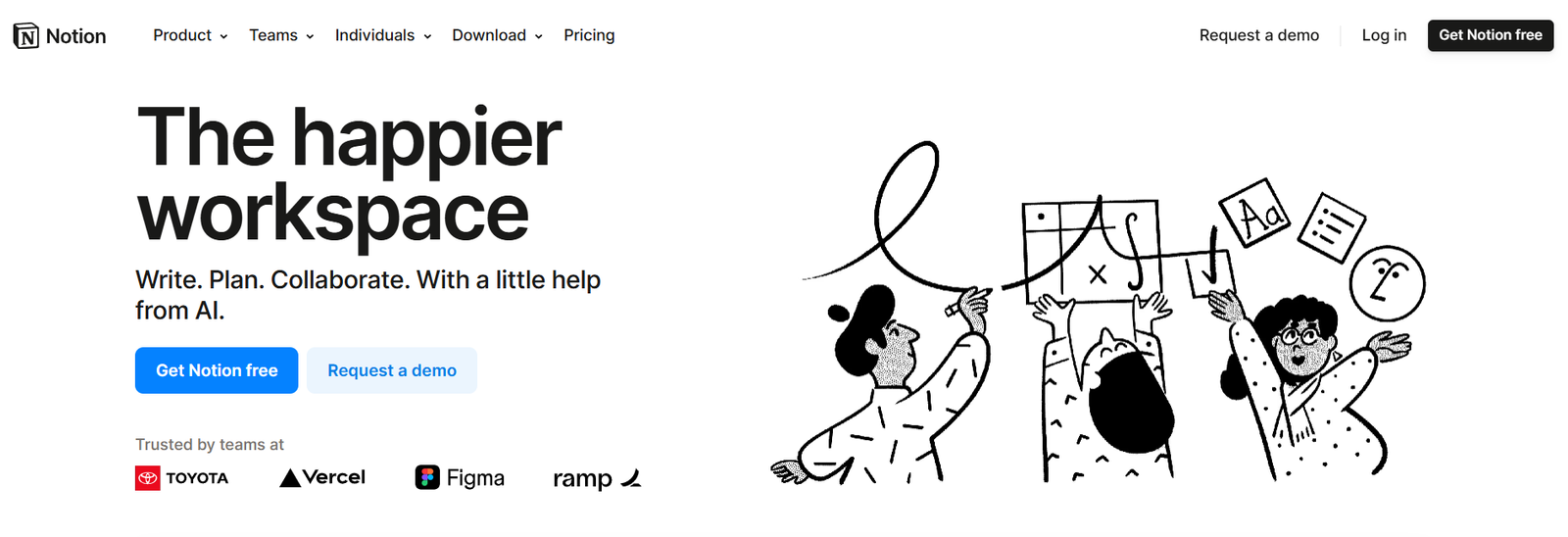
Creating content is draining.
Let’s be honest, it takes effort. It’s rewarding, sure, but it can also be exhausting.
I don’t know about you, but I’m willing to accept any help that can make content creation easier.
That’s where Notion comes in.
As a content marketer/solopreneur, I’ve tried out many tools and platforms, and I can confidently say Notion has a special place in my heart.
And because I’m never one to gatekeep valuable tools, here are 10 ways Notion can simplify content creation for you.
What is Notion?
Before you read further, you should probably know what Notion is, in case you’ve never heard of it.
Notion is an all-in-one digital workspace that blends note-taking, documents, databases, and tasks in one place.
I feel like that definition doesn’t do justice to the brilliance that’s Notion.
The platform gives entrepreneurs like you a flexible and centralized way to plan and produce your content efficiently. This means you spend less time planning and organizing and more time creating impactful content.
What’s so great about Notion is that you can get most of the benefits I’ll show you using their free plan.
Ergo, you don’t have to spend money if you don’t want to.
So, let’s get into it.
10 ways you can use Notion to Simplify Your Content Creation
1. Acts as a Centralized Content Hub
Because there are many aspects to marketing, you have all your content pieces in a hundred different places.
Maybe you have your blog posts on your Google Drive, your graphics and brand assets on Canva or Adobe, your videos are somewhere else on a different drive, and let’s not even talk about where your draft newsletters are.
The point is that everything is everywhere, and it’s annoying, time-consuming, and even expensive to keep up, and it’ll only get worse the bigger your business gets.
Instead of having different things in different places and having to pay so many subscriptions for these platforms. Notion can act as a centralized hub for all your content materials. You’ll no longer have to dig through different apps or platforms cause they can all be housed under one platform— Notion.
On Notion, you can create a Content Hub page with several sub-pages for each content type, like your blog posts, social media posts, videos, email newsletters, images, etc.
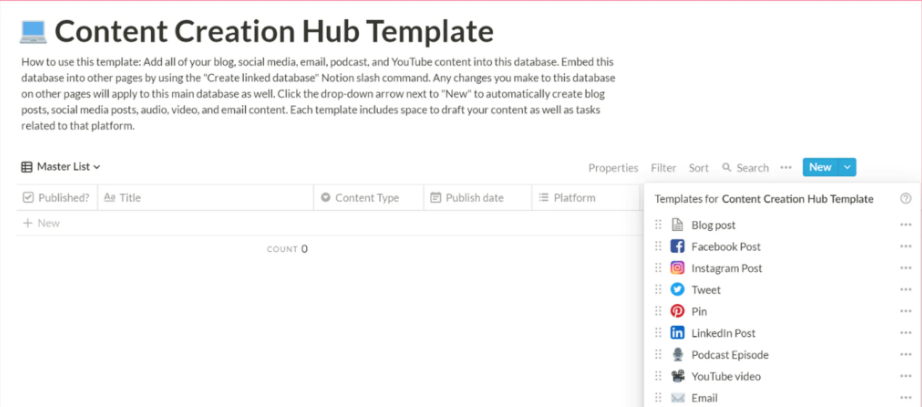
It can also act as your brand hub and keep your logos, voice, colors, guidelines, etc.
It can organize every marketing aspect of your business but keep things as separate as possible so you don’t feel overwhelmed.
2. Create Custom templates
One thing about me is that I love a good template. It simplifies your most repetitive tasks, saving you time. With Notion, you can create custom templates that streamline your processes.
For example, if you’re a podcaster, you’ll regularly need to plan your episodes before filming. You can use Notion to create a podcast episode page template with sections for the intro, guest bio, topics to discuss, sponsorships, etc.
So, instead of starting from scratch, you already have a template you just need to fill out for each episode.
Some other types of templates you can create are;
- Content calendars
- Editorial calendars
- Campaign management
- Marketing dashboards
- Social media planners
- Content pillar templates
- Email marketing planners
- SEO & keyword trackers
- Affiliate marketing trackers
- Budget and expense trackers
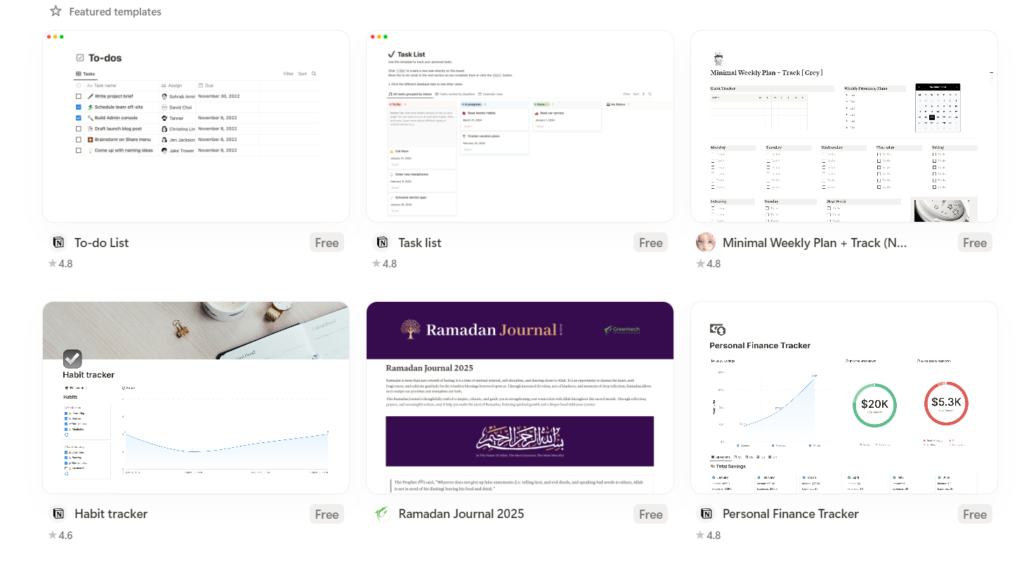
Oh, and I saved the best tip for last, not only can you create and use these templates for your business, but you can also SELL them to people.
Other business owners or content creators might benefit from your template, so why not create an additional income stream for yourself?
Or, if you don’t want to sell them, you can offer a Notion template as a lead magnet if you’re looking to grow your email list.
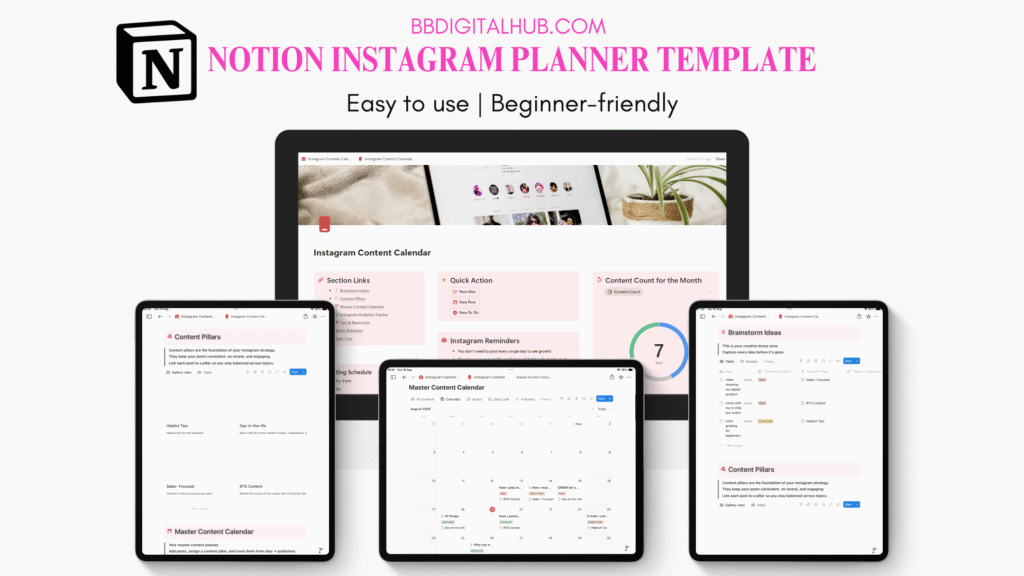
3. Database functionality
One of the reasons I love Notion is its flexibility. To be honest, I’ve yet to see a platform that is as flexible and customizable as it is.
Its database can act as a content tracker, editorial calendar, and project manager in one go. This means you can view the same content in multiple ways, such as a table, calendar, or Kanban board.
A kanban board is a visual workflow tool that helps you organize your tasks or content using columns and cards. Each column represents a stage in a process (e.g., “To-Do,” “In Progress,” “Completed”), and tasks or items move through these columns as they progress.
Let’s say you have a database of blog posts on your Notion with details like status, publish date, and topic. You can view these blog posts in different ways; in a calendar view, you can see your publishing schedule, and if you switch to a Kanban board, you can track the progress of each post.
Since all views are pulled from the same data, everything stays perfectly in sync.
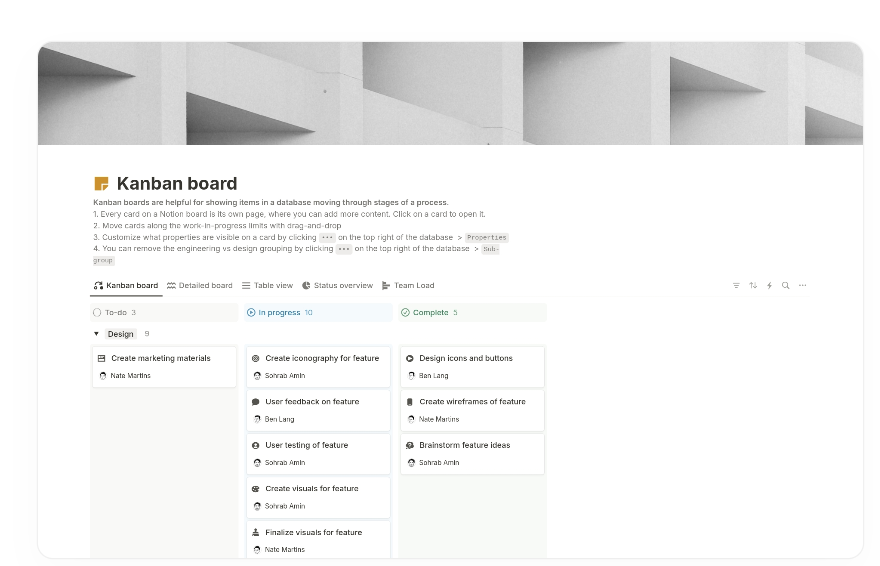
Notion makes it easy to toggle between views so you get the perspective you need.
4. Integration and Embeds.
Not only is Notion highly flexible and dynamic, but it also plays well with other platforms and tools. I know first-hand how frustrating it can be when a tool you like to use doesn’t mix well with your other tools.
You can embed or integrate third-party content and tools like your Google Drive files, loom videos, designs on Figma, PDFs, Google Analytics, Mailchimp, and even tweets.
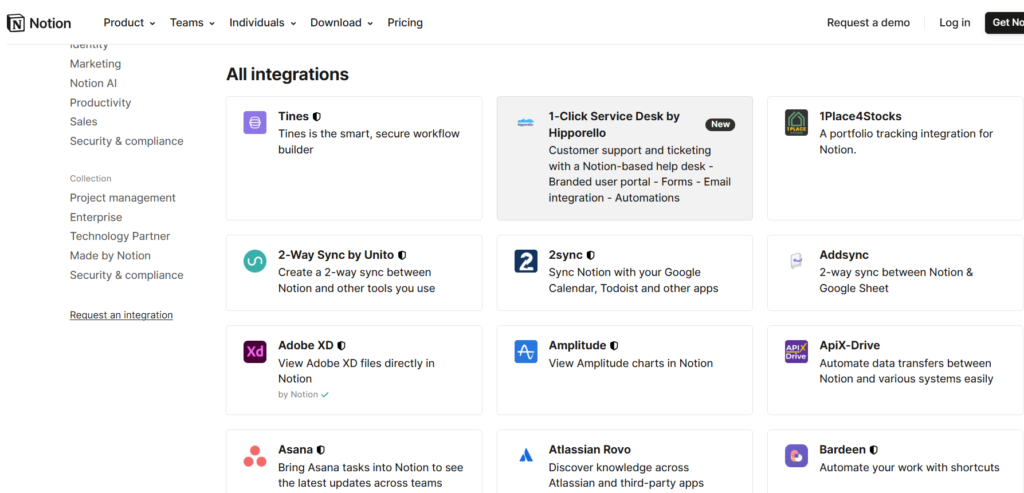
With Notion’s embed block, you can link live content from other platforms to appear in your workspace.
So, for example, say you’re an educator-creator. You can record a course on Loom, drop it in your Notion, and then share the page with your audience. Or, if you want to create a marketing report, you can integrate your Google Analytics account and access it through your Notion.
5. AI Assistance
In addition to all its amazing functionalities, Notion has an AI assistant that can help you create your content. It can help you create outlines, brainstorm content ideas, write out drafts, and even check your grammar.
Let’s say you’re trying to draft a product announcement blog post or email to send to your audience. You can jot down a list of your product’s features and benefits and use the Notion AI “summarize” command to write a draft paragraph you can customize.
Although I don’t think AI should completely replace your thinking and writing, I do believe it’s a pretty good assistant that can help speed up some content processes.
6. Task Management and Kanban boards.
As a solopreneur myself, I struggle most with consistent content creation. Before I started using Notion, keeping up with my content schedule was tough. One week, I’ll be doing fine and on time; the following week, I’ll fall behind.
With Notion, I use to-do lists and Kanban boards to stay on task and keep up.
As I mentioned in point three, Notion’s Kanban boards can help you visualize your workflow. You can set up columns for different statuses like idea, in progress, needs review, published, and any other status you want to add.
Each content piece (as a card) can be dragged across the different status stages as you complete them.
And because Notion combines your tasks with your content pages, you can track your deadlines and progress alongside the content itself.
7. SEO and Content Planning
I mentioned earlier that one of the templates you can create on Notion is an SEO & keyword tracker template. Your template can include sections like title tags, meta descriptions, primary and secondary keywords, internal links, and more.
You can then incorporate the SEO template into your content workflow, ensuring each piece of content is fully optimized before you publish.
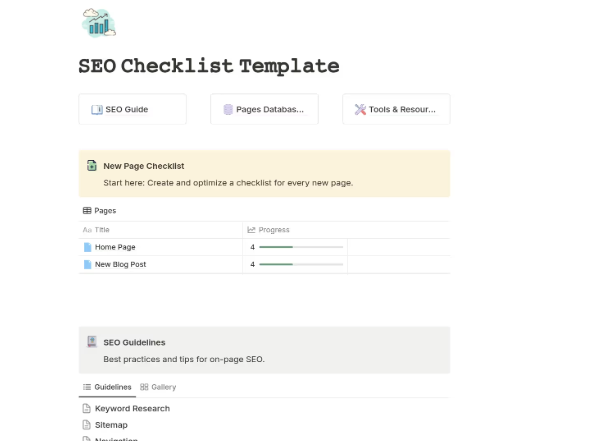
8. Offline Access and Mobile Usability
As a business owner, you’re thinking about a hundred things at a time, and you come across twice as many other things daily.
You never know when inspiration is going to hit. You need to be able to jot down your ideas and thoughts as they come, or they could be lost forever!
With Notion, you can access the desktop and mobile app versions; they all sync across all devices. I have it on both my desktop, iPad, and phone.
A random idea will never catch me unprepared.
Even if you find yourself without internet, Notion offers offline access to previously loaded pages. You can continue to write or edit offline; your changes will sync up once you’re back online.
9. Automation and Workflows
Notion can help reduce the amount of manual work you do. With its automations you can set up triggers and actions for your routine and recurring tasks.
For example, let’s say you use Zapier. When you mark a blog post as published in Notion, Zapier can automatically trigger a tweet announcement for your new post.
Remember when I said you can create templates on Notion? Your database can be configured to create a new page on the template every week or month for regularly scheduled content.
Back to our podcast example, you can configure your Notion to create a new podcast sheet in your podcast planner template for each new episode.
Notion can help you eliminate repetitive tasks and help keep your content creation workflow as simple and effective as possible.
10. Personalized Dashboards.
Just because we’re both entrepreneurs doesn’t mean our priorities are the same. Notion can help you build a customized dashboard that offers a snapshot of what matters most to you.
A dashboard in Notion is a page where you pull together all key elements of your workspace via links, widgets, etc, into a single overview.
Your personalized dashboard can include your content calendar, your top-priority content pieces, your analytics numbers, and even your business goals.
You can design this dashboard however you please.
For a more detailed example, your personalized dashboard can contain the current week’s publishing schedule, a to-do list of the week’s content tasks, and an embed of your real-time website traffic stats. It can also induce quick links to your most used resource pages, like your brand guide.
Having an effective personalized dashboard means you won’t have to dig for the information you want. Your dashboard acts as a homepage so you can get what you want easily.
Notion ensures that every day, when you start work, you know exactly where to look and what to work on next.
It turns content creation from a cumbersome process into a streamlined one, and I don’t know where I would be without it.
I think I’ve blabbed enough about Notion. You can try it out for free now.
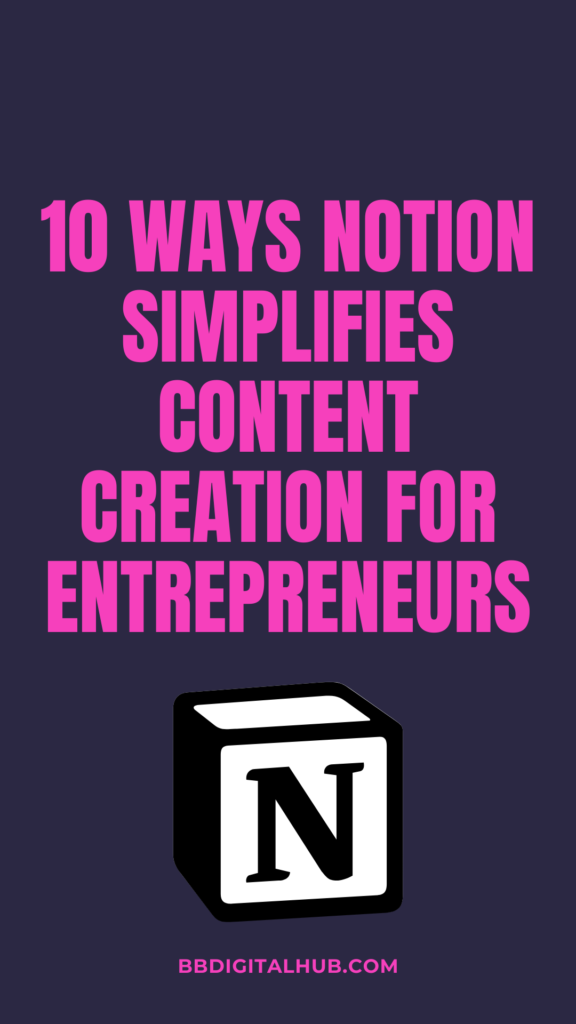

Leave a Reply